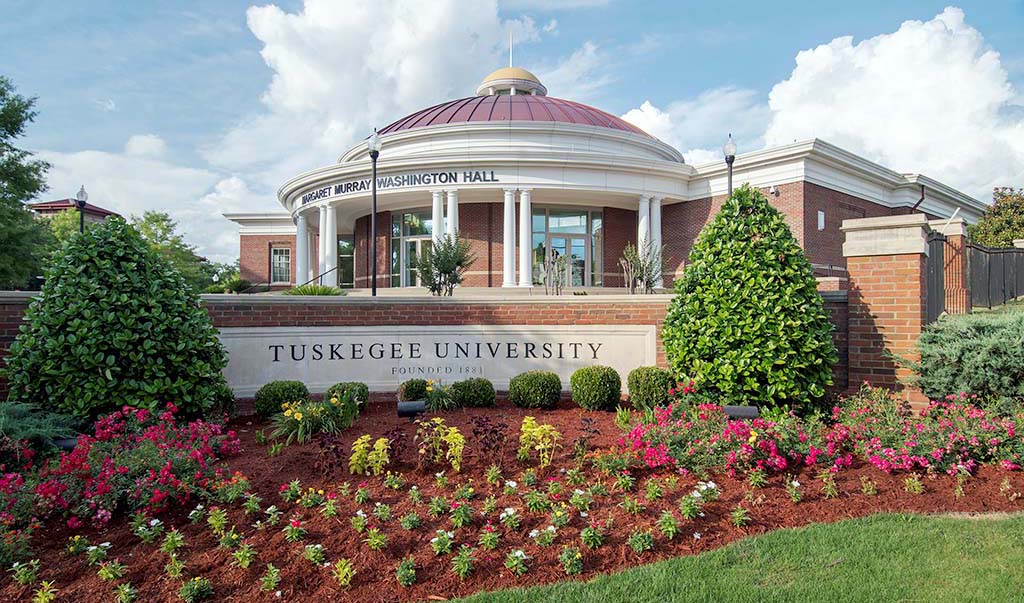
Explore HBCU – Tuskegee University
Tuskegee University is a private, historically black, land-grant institution in Tuskegee, Alabama.
Background
In 1880, Lewis Adams, a local Black leader who was formerly enslaved, pushed for the re-election of W.F. Foster in order to secure funding for an educational institution for black individuals in Alabama. Adams was successful, and as a result, a $2,000 appropriation was authorized for the school. By July of 1881, the Tuskegee Normal School for Colored Teachers was founded, with educator Booker T. Washington acting as principal of the school from its opening until his death in 1915.
While initial space and building for the school was provided by the Butler Chapel AME Zion Church, the campus was eventually moved to an abandoned plantation that spanned 100 acres. Independence was gained by the institution in 1892 when Tuskegee Normal and Industrial Institute was granted authority to act independent of the state of Alabama.
Tuskegee obtained its university status in 1985, after which point the school became Tuskegee University. Today the institution has risen to national prominence with over 3,000 students on a campus that spans over 5,000 acres with more than 100 buildings. The University is accredited by the Southern Association of Colleges and Schools Commission on Colleges (SACSCOC).
Programs & Opportunities
Since its attainment of university status, Tuskegee has continued to expand its educational offerings. The College of Business and Information Sciences was established and professionally accredited, while the college of Engineering, Architecture and Physical Sciences was expanded to include an Aerospace Engineering Department.
Doctoral programs in integrative biosciences and materials science and engineering are also offered, while Tuskegee’s Chemistry program is one of only a few HBCUs approved by the American Chemical Society.
Tuskegee University offers education at the undergraduate and graduate level, with more than 50 degree offerings Tuskegee also boasts many social organizations, co-curricular student initiatives, leadership opportunities, campus civic, religious organizations, Greek Letter, and intramural sport and recreational activities.
Learn more about what Tuskegee University has to offer here.
Alumni Affairs
Tuskegee University’s focus on the nurture and development of morally and intellectually guided individuals stresses the connection between education and a socially-conscious student body.
Some notable Tuskegee University alumni include, but are not limited to:
- Jessica A. Scoffield—microbiologist and assistant professor in the Department of Microbiology at the University of Alabama’s school of medicine—graduated from Tuskegee University with undergraduate and graduate degrees in microbiology.
- Milton C. Davis—lawyer who secured a full pardon for the last known surviving “Scottsboro Boy,” and first African American in Alabama to be named a State Assistant Attorney General—completed a bachelor’s degree in Political Science at Tuskegee
- Amelia Boynton Robinson—activist, leader of the Civil Rights Movement in Selma, Alabama, and Martin Luther King, Jr. Freedom Medal awardee—graduated from Tuskegee University with a degree in home economics.
- Lionel Richie—renowned singer and songwriter, producer, and television judge—graduated from Tuskegee University with a Bachelor of Science degree in Economics.
Financial Information
At Tuskegee University, due to the variety of academic study available, pricing options differ. For full-time undergraduate students, the most recent financial data reports an estimated tuition rate of $19,594 for a course load ranging between 12-18 credit hours in an academic year. For full-time graduate students with a range of 8-15 credit hours, financial data reports an estimated tuition rate of $20,378 for the academic year.
To ensure that eligible students have the opportunity to attend Tuskegee, the office of Student Financial Services manages financial aid and scholarship resources from university, federal, state, county, and private sources.
Conclusion
Tuskegee University continues to be an institution dedicated to the broad aims of advancing the education of the Black community and greater society. Tuskegee students are sensitively oriented in ways that produce publicly-spirited graduates who are committed to public service and scholarship.
Learn more about Tuskegee University here.
Sources:
- https://findmyhbcu.org/school/tuskegee-university/
- https://www.tuskegee.edu/about-us/history-and-mission
- http://encyclopediaofalabama.org/article/h-1583#:~:text=In%201985%2C%20the%20school%20changed,Industrial%20Institute%20to%20Tuskegee%20University.
- https://www.tuskegee.edu/about-us
- https://www.tuskegee.edu/one-stop/degree-programs
- https://www.tuskegee.edu/student-life/student-life-and-development
- https://apps.medicine.uab.edu/FacultyDirectory/FacultyData.asp?Entity=SOM&FID=92434
- https://www.tuskegee.edu/news/tuskegee-university-announces-second-annual-virtual-homecoming-alumnus-milton-davis-71-to-serve-as-grand-marshal
- http://archive.tuskegee.edu/archive/handle/123456789/930
- https://www.nps.gov/people/amelia-boynton-robinson.htm
- https://www.tuskegee.edu/news/lionel-richie-74-valerie-jarrett-to-lead-tuskegee-universitys-inaugural-host-committee
- https://www.tuskegee.edu/Content/Uploads/Tuskegee/files/Financials/Tuition-and-Fees-Sheet-2021-2022-%206-10-2021.pdf
- https://www.tuskegee.edu/programs-courses/bursar
Pictures:
- Tuskegee University Logo: https://www.planetforward.org/consortium/tuskegee-university
- Tuskegee Banner Brick Wall Sign: https://www.blackpast.org/african-american-history/tuskegee-university-1881/
- Tuskegee University Campus: https://uncf.org/member-colleges/tuskegee-university
- Tuskegee University Students:https://www.facebook.com/StudentLifeatTU/photos/
